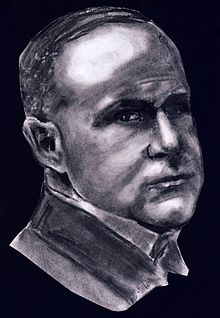Richard Roht
Richard Roht (born March 31st July / April 12th 1891 greg. In the village Ihamaru in the municipality Krootuse, today rural municipality Kõlleste , Põlva County , Estonia ; † August 22nd 1950 in Tallinn ) was an Estonian writer .
Life
Richard Johannes Roht attended the renowned Hugo-Treffner-Gymnasium in Tartu, Livonia, and the Realschule in Valga , but dropped out of school. From 1912 to 1914 he lived in Tartu, Saint Petersburg and Helsinki . During this time he submitted his first literary attempts.
Together with Henrik Visnapuu (1891–1951) and Marie Heiberg (1890–1942), Roht founded the loose group Moment in 1913 with an anthology of the same name. It was intended as a protest against the literary group Noor-Eesti and showed futuristic features. In 1914, Roht and Visnapuu published the follow-up volume, Roheline moment , which was printed on green paper, but which hardly met with criticism.
In 1914 Roht was drafted into the tsarist army. He fought on the front lines of the First World War . In 1919/1920 he took part in the Estonian War of Independence .
In 1917/18 Roht belonged to the literary Siuru movement. From 1920 to 1927 he lived as a freelance writer in Tartu. In March 1920 Roht published the anthology Looming I together with Henrik Visnapuu and Johannes Barbarus . This phase of life was interrupted by a stay in Berlin from 1921 to 1923 . There he published the first three of a total of nine issues of the Estonian magazine Aeg in 1922 .
Above all, Roht's novel Hümnid Paanile ("Hymnen an Pan"), published in 1922 , which introduced the so-called Kurgsoo series, found recognition. It is also called the Tuulemäe series after its location and describes life in an Estonian village in the 1920s. In addition, Roht wrote numerous novels, short stories, short stories and children's literature.
From 1928 to 1930 Roht lived as a farmer in Sangaste in southern Estonia and tried to build a Neusiedlerhof. The novels See, millest avalikult ei räägita (1928) and Nauding (1929), in which Roht idealized rural life , fall during this period . In 1930 he was heavily indebted, was jailed for forgery and spent a year and a half in prison. He later settled in the Estonian capital Tallinn, where he died in 1950.
Richard Roht has left a very extensive prose work of over fifty works. Numerous works were also reprinted during the Soviet occupation of Estonia.
Literary work
"Kurgsoo series"
- "Hümnid Paanile" (novel, 1922)
- "Viimane kevad" yes "Kriuka Kusta armastus" (from the collection of novels "Neli juttu", 1924)
- "Kurgsoo" (novel, 1924)
- "Maa" (novel, 1927)
- "Aeg" (novel, 1929)
Novels
- "Minevik" (1920)
- "Üksindus" (1925)
- "See, millest avalikult ei räägita" (1928)
- "Nauding" (1929)
- "Vastsed rajad" (1933)
- "Võitluse teel" (1933)
- "Esimene armastus" (1935)
- "Verioja mõis" (1936)
- "Ummiktänav" (1937)
- "Elutee" (1938)
- "Inimsaatused" (1938)
- "Igapäevased inimesed" (1937)
- "Talulapsed" (1939)
- "Kuldsed päevad" (1939)
- "Kodutalu" (1940)
- "Kaks perekonda" (1947)
Novel collections
- "Igaveses labürindis" (1913)
- "Üksinduse meeleolud" (1914)
- "Siluetid ja Dekoratsioonid" (1918)
- "Hing ja veri" (1918)
- "Kolm Näokatet" (1919)
- "Neli juttu" (1925)
- "Vabadus ja vangla" (1932)
- "Kitsad piirid" (selection collection, 1946)
- "Öö" (selection collection, 2007)
memories
- "Sõjasõit" (1928)
- "Vana Võrumaa" (1934)
- "Tsaari ohvitser" (1935)
- "Kahuriliha" (1936)
Children's books
- "Laanekohus" (1928)
- "Väikesed rändurid" (1934)
- "Noor elulaevnik" (1934)
- "Vetepojad" (1934)
- "Väleküüs ja Tuhknai" (1935)
- "Suvised rõõmud" (1936)
- "Võrukael" (1945)
- "Jäneste pulmad" (1946)
- "Lapsed, linnud ja loomad" (1947)
- "Laaned ja veed" (1949)
- "Kaks poissi puhkusel" (1949)
- "Jutte loomadest" (1951)
- "Lapsed ja loomad" (2007)
Secondary literature
- August Pill : “Mälestusi Richard Rohust” In: Keel ja Kirjandus 1961, No. 7, pp. 430–436
- Reet Krusten : "Richard Roht lastekirjanikuna" In: Keel ja Kirjandus 1991, No. 4, pp. 205–208
- Oskar Kruus : Pürgimine laineharjale In: Looming 1991, No. 5, pp. 682-692
Web links
- CV and works (Estonian)
Individual evidence
- ↑ Cornelius Hasselblatt : History of Estonian Literature. Berlin, New York 2006 ( ISBN 3-11-018025-1 ), pp. 400f.
- ↑ Eesti Elulood. Tallinn: Eesti Entsüklopeediakirjastus 2000 (= Eesti Entsüklopeedia 14) ISBN 9985-70-064-3 , p. 431
| personal data | |
|---|---|
| SURNAME | Roht, Richard |
| BRIEF DESCRIPTION | Estonian writer |
| DATE OF BIRTH | April 12, 1891 |
| PLACE OF BIRTH | Ihamaru village in Krootuse parish, now Kõlleste rural parish , Põlva county , Estonia |
| DATE OF DEATH | 22nd August 1950 |
| Place of death | Tallinn |
